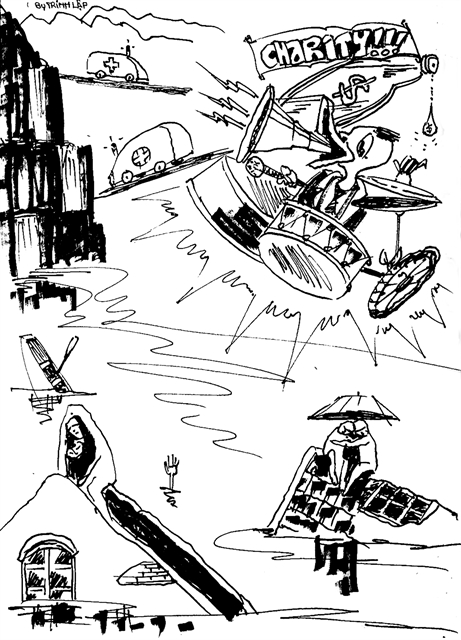 Talk Around Town
Talk Around Town

 |
| Illustration by Trịnh Lập |
By An Phương
The topic of charity being used as a marketing tool for self-promotion has sparked debate in Việt Nam, especially in the wake of the devastation caused by Super Typhoon Yagi three weeks ago.
This powerful storm left millions affected, with severe damage to homes, infrastructure, and livelihoods, particularly in northern and central regions of the country.
In response to the disaster, numerous donation drives were launched, with organisations and individuals, including multiple celebrities, contributing aid.
However, this surge in charitable actions has also led to criticism, with some questioning whether certain youth influencers are using these relief efforts as an opportunity for self-promotion.
The criticism stems from the perception that, instead of focusing on genuine support for those in need, some use the visibility of their donations to enhance their public image or increase brand recognition.
My 30-year-old friend Thu Anh told Việt Nam News, “I was shocked by how 12,028 pages of financial statements detailing donations for people affected by Typhoon Yagi sparked a new ‘storm’ on social media.”
“That evening, when the Việt Nam Fatherland Front Central Committee (the organisation responsible for aid reception) published all the donation records, my social media feed was flooded with people eager to see if their idols had contributed,” she said.
Images of successful money transfers, ranging from tens to hundreds of millions of đồng, initially warmed our hearts. However, many of these numbers have since been revealed as fake.
“I couldn’t help but feel angry!” Thu Anh added, and I completely agreed with her.
Former gymnast L.P. became a trending topic after netizens accused her of photoshopping a donation receipt to the Fatherland Front, which revealed a smaller amount than she had claimed.
In response, L.P. suggested the transfer could have been made by someone with a similar name, but her explanation only intensified the backlash.
Previously, L.P. shared screenshots suggesting a large donation, with emojis covering parts of the amount, leading netizens to assume she had donated around VNĐ500 million. However, recent checks revealed the actual amount was only VNĐ500,000.
“What L.P. did is unacceptable! This controversy, together with similar cases, also ties into the growing concern in Việt Nam about the commodification of charity in the influencer era, where public acts of generosity can be manipulated for fame rather than genuine altruism,” Quốc Bảo, 35, said.
In my view, those who enjoy showcasing their charitable efforts have at least made some contribution.
“Those with more give more, and those with less give less. At least each of us is doing something for our fellow Vietnamese, and that’s what truly matters,” Thu Anh said.
While some heartwarming donation photos may serve as a way for individuals to indulge in a fantasy and seek applause from netizens, inflating the amounts for bragging rights is misguided, we both agreed.
“The reputation of the Việt Nam Fatherland Front Central Committee could be negatively impacted, as relevant authorities might face scrutiny over funds they claim to have received, potentially undermining the hard work and trust in volunteer efforts,” Bảo said.
He added that this case underscored the importance of transparency. The release of financial records was a positive step toward building trust and ensuring that aid would reach those in need.
“This will also allow the public to monitor the process and clarify the motives behind any dishonest actions on social media, exposing any malicious intent,” Quang Thắng, 30, said, adding that social media users should carefully filter information and avoid blindly praising individuals who use charity as a form of marketing.
Through this, the credibility of the aid programmes initiated by the Fatherland Front at all levels would be affirmed, while also strengthening the spirit of solidarity within the community, Thắng said.
It is undeniable that public figures have always played an important role in rallying support during times of crisis.
As Việt Nam continues to face challenges like natural disasters, the need for sincere and effective charitable actions remains paramount.
It is essential that the youth, in their eagerness to contribute, do so with genuine intentions rather than as a means to garner likes and followers.
The community's call for greater oversight in charity initiatives serves as a reminder that the true spirit of giving lies in helping others, not in promoting oneself.
While the actions of some may overshadow the good intentions of many, it is vital to foster a culture where charity is synonymous with authenticity.
By doing so, we can ensure that the next wave of charitable deeds is rooted in compassion and commitment to community well-being, reinforcing the notion that true generosity thrives away from the spotlight. VNS